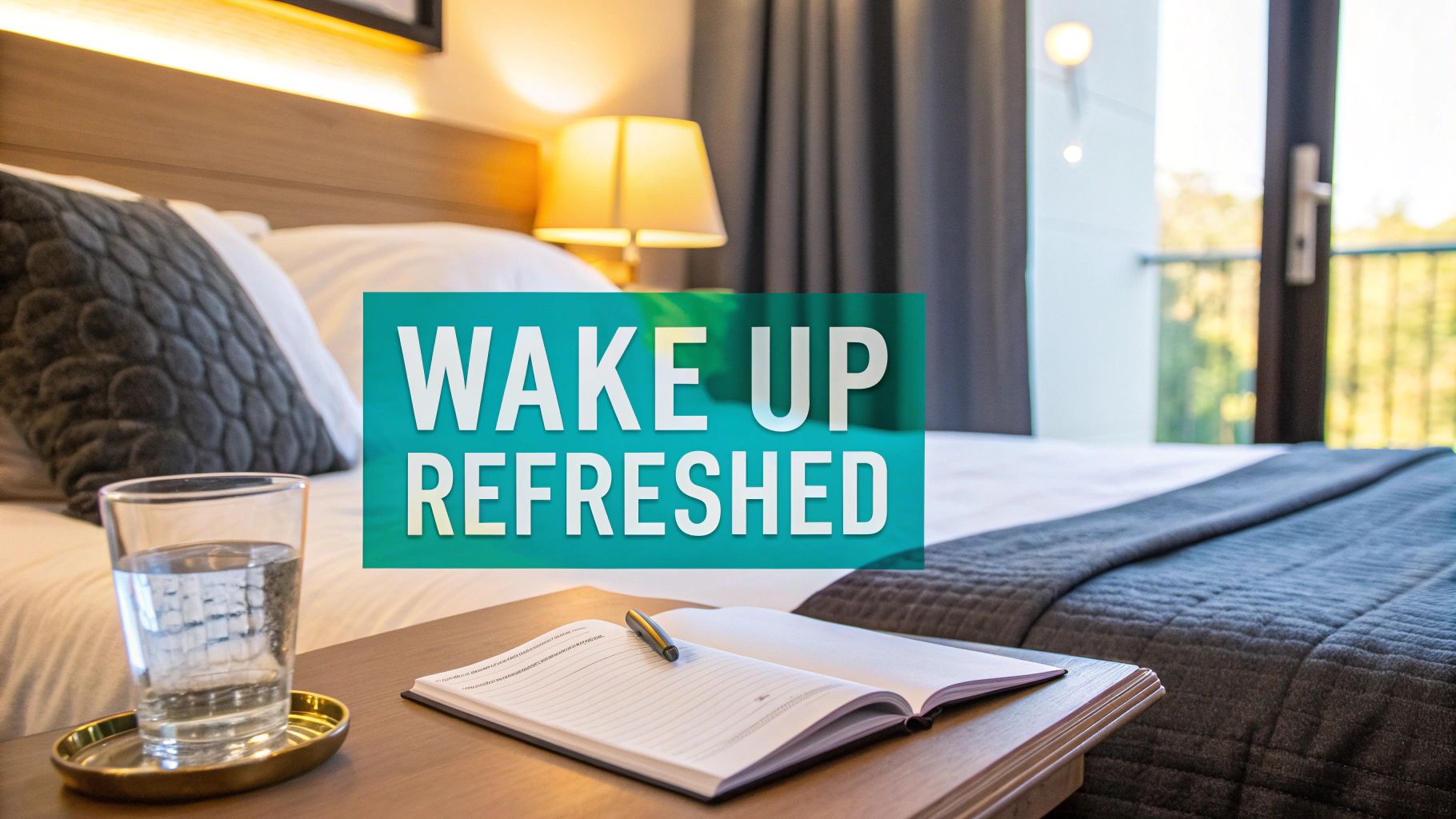

· By Annemarie
How to Wake Up Refreshed and Beat Morning Fatigue
It’s a story most of us know all too well. You get your full eight hours, but the alarm clock still feels like a personal attack. You smack the snooze button, drag yourself out of bed, and stumble through the morning in a dense fog.
If this sounds like your daily routine, you're definitely not alone. And chances are, it's about more than just a single bad night's sleep.
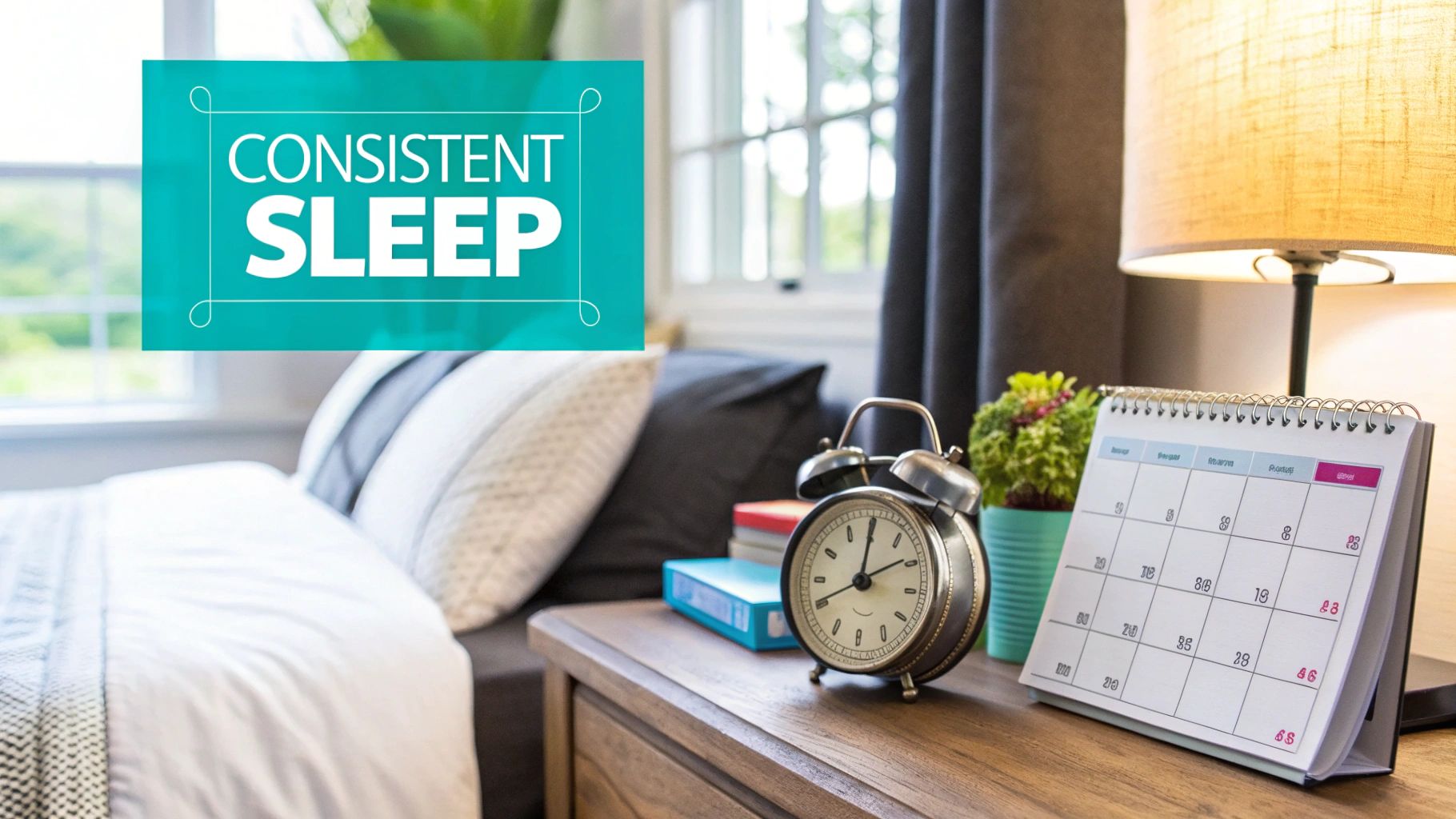
Our modern lives have cooked up a unique recipe of challenges that get in the way of us waking up feeling genuinely restored. We're not just talking about the obvious stuff, like a late-night espresso or the neighbor's barking dog. We're dealing with a constant, low-level hum of pressures that slowly drain our batteries.
The Problem of Sleep Anxiety
One of the biggest culprits I’ve seen emerge recently is sleep anxiety. It’s that weird, counterintuitive stress you feel about getting enough sleep. You lie there, worrying about not sleeping, which, of course, keeps you awake. It’s a vicious cycle.
This isn't just a feeling; it's a growing phenomenon. One study pointed out that nearly 40% of Gen Z adults deal with this anxiety multiple times a week, often fueled by endless digital notifications and financial stress.
This often leads to something called 'orthosomnia'—a flat-out obsession with tracking every second of your sleep on a fitness watch or app. Instead of being helpful, constantly checking your sleep score can just pile on more stress, making the whole situation worse.
How Your Lifestyle Chips Away at Your Energy
Beyond the mental game, your everyday habits and surroundings have a massive say in how you feel in the morning. What you eat and, especially, what you drink can make or break your energy levels the next day.
For instance, even just one or two alcoholic drinks can seriously mess with your REM sleep, which is crucial for feeling mentally refreshed. That’s why you can sleep for nine hours after a night out and still wake up feeling groggy and completely drained. Getting a handle on how alcohol impacts your rest is a game-changer. If you want to dive deeper, we have a whole guide on understanding fatigue from alcohol and how to prevent it.
The good news? All of these things are within your control. Once you start to see these hidden stressors for what they are, you can stop relying on generic advice and start building a real strategy that tackles the root causes of your fatigue.
Build an Evening Routine That Works for You
If you really want to know how to wake up refreshed, you have to start thinking about the hours before your head even hits the pillow. Trust me, a great morning doesn't just happen by accident—it’s the direct result of a solid evening.
Putting together a simple wind-down routine is like sending a memo to your brain: the day is officially over, and it's time to prep for some serious rest. This doesn't have to be some elaborate, hour-long production. It's all about finding a few small, powerful habits that actually fit into your real life.
The "Digital Sunset"
Probably the single most effective change you can make is creating what I call a "digital sunset." It's simple: put away all your screens—phone, tablet, laptop, TV—at least 90 minutes before you plan to go to sleep. We all know the blue light from these things is the arch-nemesis of melatonin, the hormone that keeps your sleep cycle in check.
But it’s more than just avoiding light. When you switch off your electronics, you’re giving your mind a much-needed break from the constant feed of information, notifications, and low-key anxiety that keeps it buzzing.
Think of it like shutting the door on all the mental clutter you've accumulated throughout the day. Instead of scrolling, you get to pivot to things that actively calm your nervous system down.
Nail Down Some Simple Wind-Down Rituals
So, the screens are off. Now what? The goal here is to find simple, calming activities that help you shift from a "doing" mode to just "being."
Here are a few ideas that work for a lot of people:
- Brain Dump in a Journal: Just take five minutes to scribble down whatever is floating around in your head. It could be a to-do list for tomorrow, a quick recap of the day, or any worries that are sticking around. Getting it out on paper really does help lighten the mental load.
- Read a Real Book: Unlike an iPad or Kindle, a physical book doesn’t throw sleep-wrecking light in your face. There’s no better way to quiet an overactive mind than by getting lost in a good story.
- Get Your Hydration Right: Being properly hydrated is a game-changer. You don't want to chug a gallon of water and be up all night, but making sure you're hydrated throughout the evening can stop you from waking up with a sandpaper mouth at 3 AM. For an extra boost, something like Upside Hangover Sticks can also help support your body’s natural recovery processes overnight, so you’re one step ahead before the morning even starts.
Optimize Your Bedroom for Deep Sleep
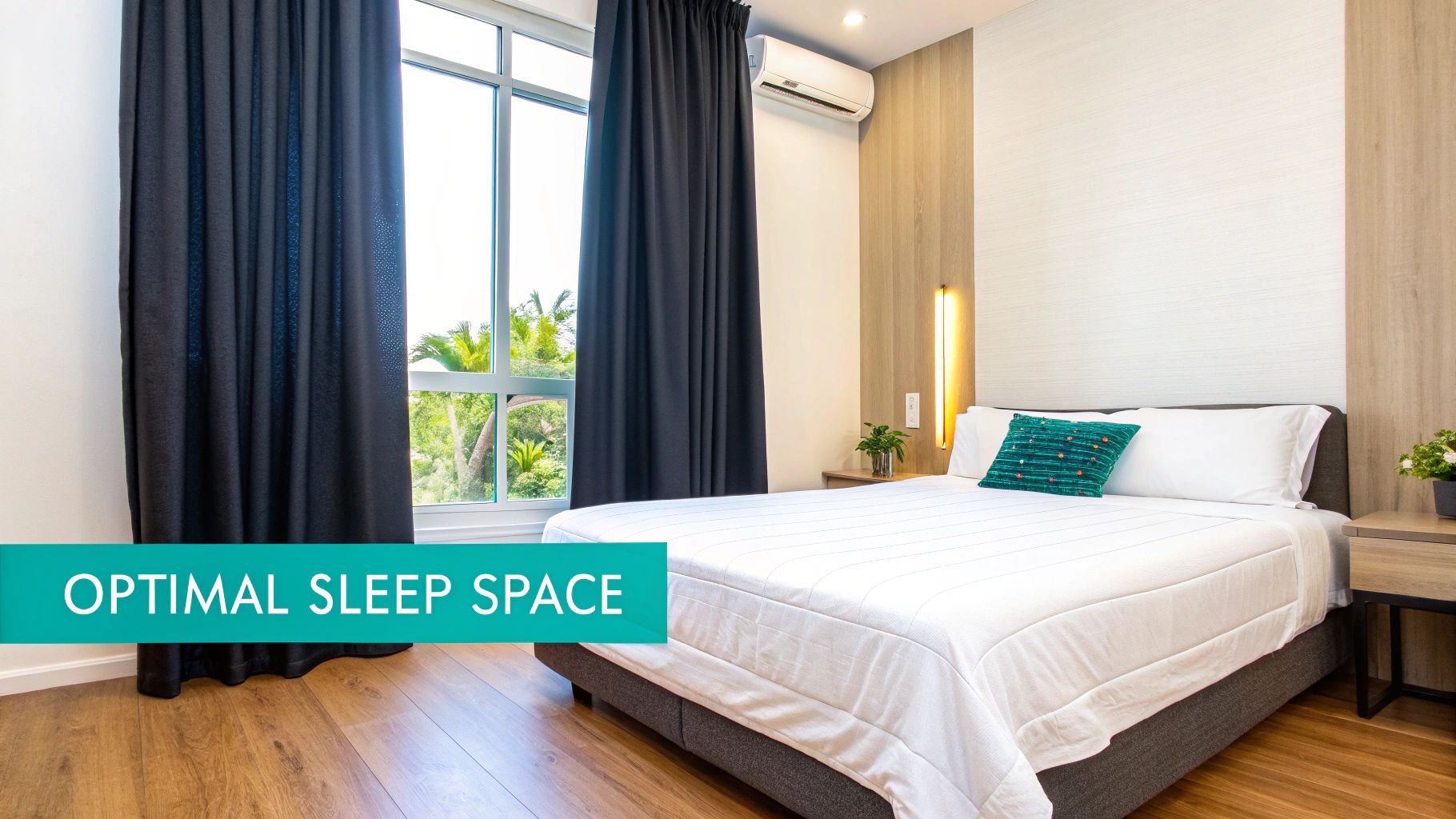
Even the best evening routine can fall flat if your bedroom isn't pulling its weight. The real magic happens in the hours you're actually asleep, and your environment plays a massive role. If you’re serious about figuring out how to wake up refreshed, you need to treat your bedroom like a sanctuary—a space dedicated to deep, uninterrupted rest.
It’s time to fine-tune your sleep space.
Turn Your Room into a Sleep Cave
First things first, make your room as dark as humanly possible. Think like a caveman. Even a sliver of light from a streetlamp or the tiny blinking LED on your phone charger can mess with your body's melatonin production, which is the hormone that tells you it's time to sleep.
A great pair of blackout curtains is one of the fastest, most effective upgrades you can make. Total darkness is the goal.
Drown Out Disruptive Noises
Next up, let's talk about sound. You can't exactly ask your neighbor to skip their 6 AM lawn-mowing session, but you can control your room's soundscape. A white noise machine is a game-changer for many, but even a simple fan can work wonders. It creates a consistent, soothing hum that masks those sudden, jarring noises that pull you out of deep sleep.
This isn't just a personal struggle; it's a global one. A recent survey found that people lose nearly three nights of quality sleep every single week, with stress and anxiety leading the charge. You can dig into the full story on these widespread sleep challenges in the 2025 Global Sleep Survey from ResMed.
Dial Down the Thermostat
Finally, cool things down. I mean really cool things down. Study after study confirms that a cool room promotes significantly better sleep.
Your body's core temperature naturally dips to initiate sleep, and a colder room helps that process along. The sweet spot is surprisingly chilly: aim for around 65°F (18°C).
Of course, your mattress and pillows matter, too. Don't think of them as just furniture; they're an investment in your health. A supportive mattress and the right pillow for your sleep style prevent the constant tossing and turning that fragments your rest.
By dedicating your bedroom to sleep and intimacy only, you send a powerful psychological signal to your brain. You're training it to associate that space with rest, which can help you fall asleep faster and stay asleep longer.
Create a Morning Routine That Actually Energizes
How you spend the first 30 minutes of your day can completely set the tone for the next several hours. A good morning routine isn’t about piling on more chores; it’s about a few smart moves that cut through that groggy, half-asleep feeling and leave you feeling genuinely alert.
First things first: immediate hydration. Think about it—you've just gone hours without a sip of anything. Your body is naturally dehydrated, which is a huge reason you feel so foggy and sluggish. Before you even think about coffee, drink a full glass of water. It's a simple act that kickstarts your metabolism and gets your brain rehydrated and ready to go.
Next up, get some natural light on your face as soon as you can. Sunlight is the most powerful signal you can send your brain to reset its internal clock (your circadian rhythm). Just 5-10 minutes of morning sun tells your brain to cut the production of melatonin—the sleep hormone—and start ramping up for the day.
Ditch the Snooze Button for Good
If you really want to learn how to wake up refreshed, you have to break up with the snooze button. It’s non-negotiable. Every time you hit snooze and drift back into that light, choppy sleep, you’re starting a new sleep cycle you have no hope of finishing. This is called sleep inertia, and it's the very reason you often feel more tired after snoozing than you did when your first alarm went off.
The trick is to make getting out of bed an automatic action. A classic for a reason: put your alarm clock or phone across the room. It forces you to physically get up, breaking that cozy temptation to fall back asleep.
This little visual breaks down a simple evening flow that sets your morning up for a win, with a big focus on creating some healthy space from your devices.
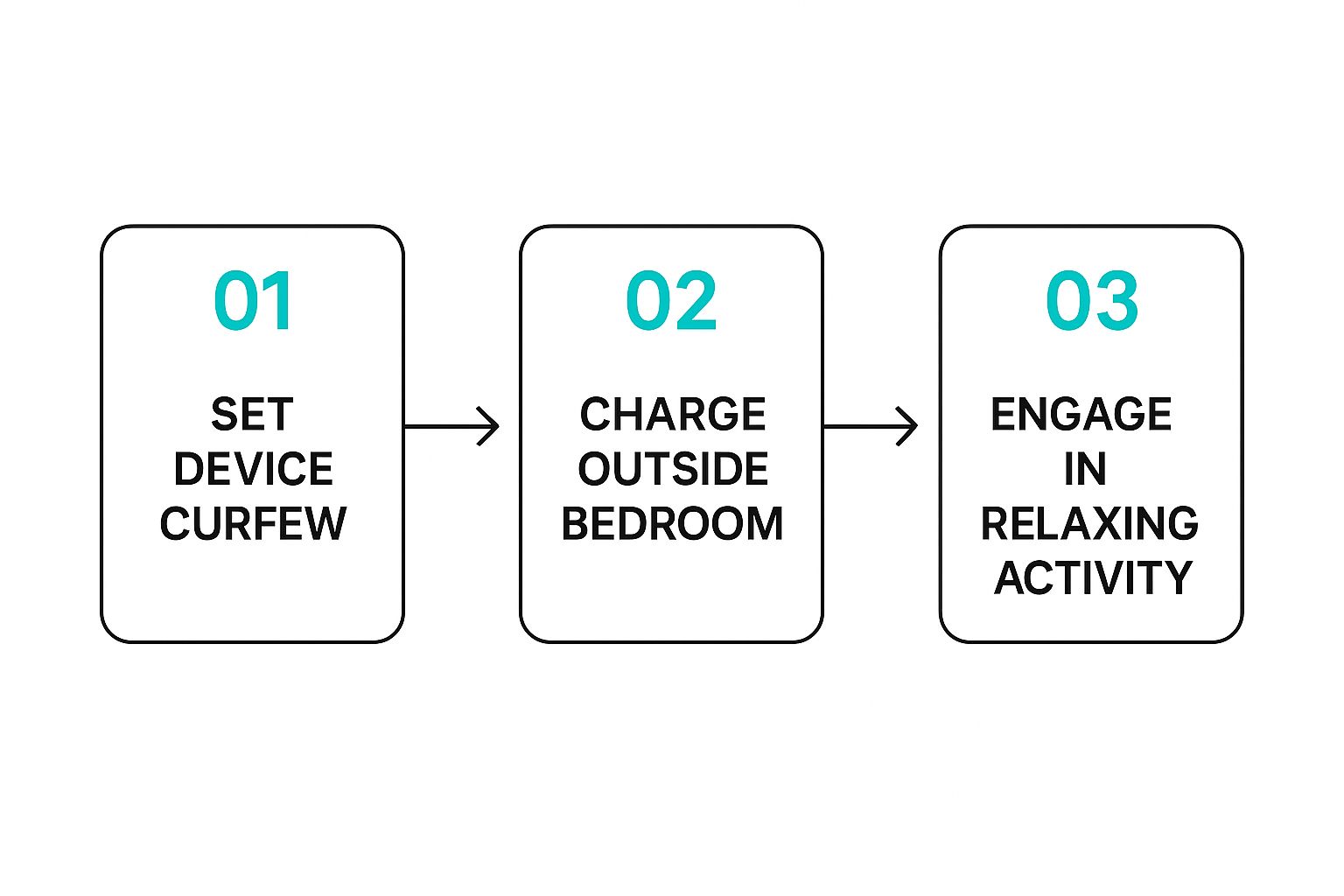
As the infographic shows, putting your phone away before bed is a foundational step for better sleep. When you combine smart evening habits with a powerful morning routine, you create a full 24-hour cycle that supports consistent energy. For more ideas on this, check out our detailed guide on how to get energy in the morning.
Once you're finally up, try to resist the magnetic pull of your phone. Give yourself at least 15-20 minutes of screen-free time. Let your brain wake up on its own terms, without the instant jolt of stress from work emails and social media notifications.
Here's a quick look at how these morning components work together to help you feel your best.
Morning Routine Component Breakdown
| Activity | Why It Works | Time Commitment |
|---|---|---|
| Drink Water | Rehydrates your body and brain after sleep, kickstarting your metabolism. | 1-2 minutes |
| Get Sunlight | Signals your brain to stop producing sleep hormones and increase alertness. | 5-10 minutes |
| Light Movement | Gentle stretching or a short walk gets blood flowing and wakes up your muscles. | 5-15 minutes |
| Avoid Phone | Prevents an immediate spike in stress hormones, allowing for a calmer start. | 15-20 minutes |
Building these small, intentional actions into the first half-hour of your day can make a massive difference. You're not just waking up; you're actively setting the stage for a more energized and focused day ahead.
Make Lifestyle Changes for Lasting Energy
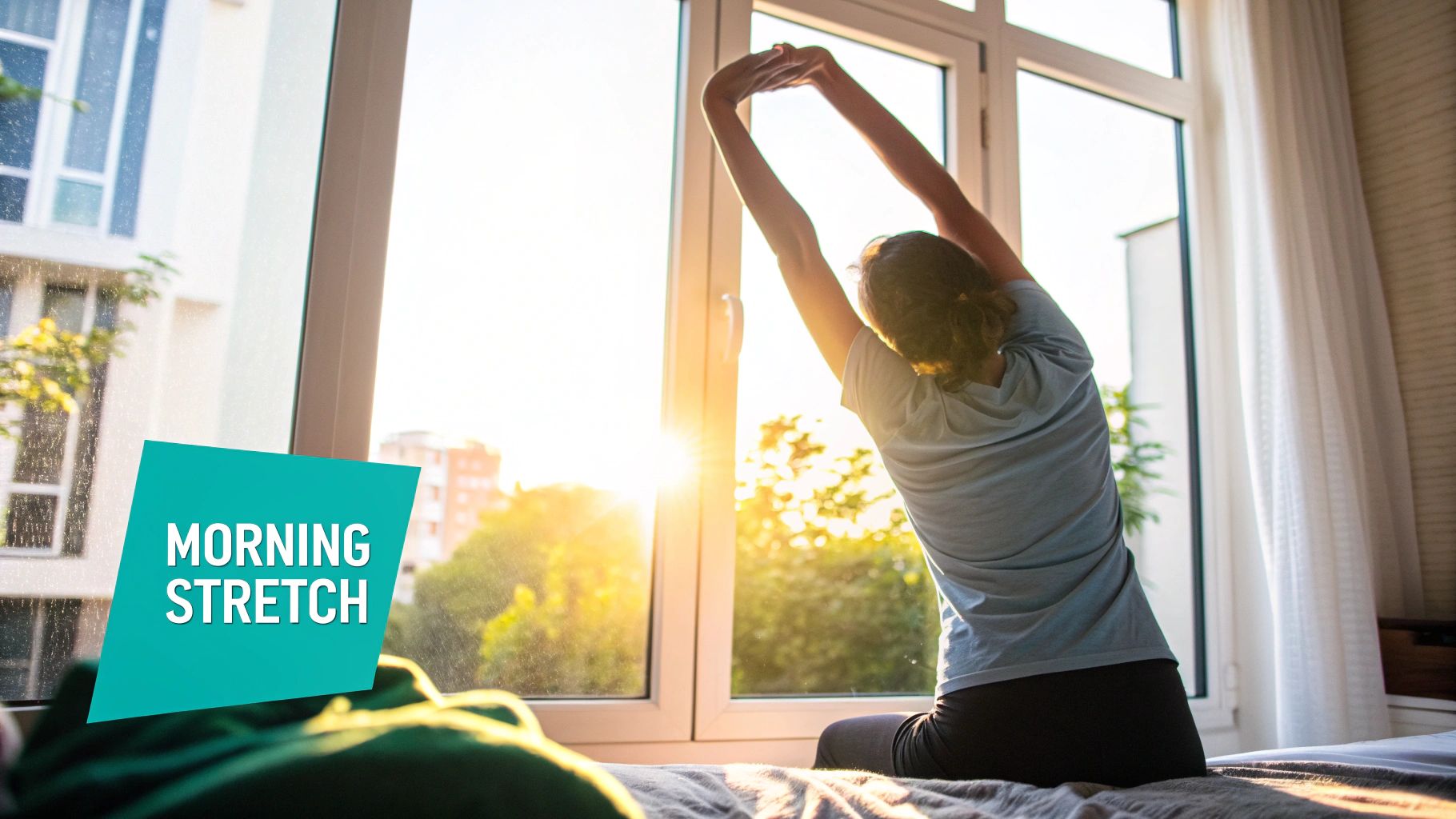
If you're serious about waking up refreshed every single day, it’s not about quick fixes. It's about the entire rhythm of your day. Your daily habits—from when you eat to when you move—build the foundation for great sleep and even better mornings. Getting these simple things right is what takes you from groggy and dragging to genuinely energized.
A great place to start is with a "caffeine curfew." We all love our coffee, but caffeine has a surprisingly long half-life. That means it can hang around in your system for hours, getting in the way of deep, restorative sleep later on. For most people I know, making 2 PM their absolute cutoff for coffee, tea, or soda is a total game-changer.
The same goes for timing your workouts and meals. A tough gym session too close to bedtime can leave you feeling amped up, while a big dinner forces your body to focus on digestion when it should be winding down. A good rule of thumb is to finish any intense exercise and your last large meal at least three hours before you plan to hit the hay.
Master Your Internal Clock
The single most powerful lifestyle change you can make for consistent energy is locking in your sleep schedule. This isn't just a suggestion; it's a non-negotiable. It means going to bed and waking up around the same time every single day—and yes, I mean even on weekends.
This practice is the number one way to get your body’s internal clock, or circadian rhythm, on your side. When your body knows what to expect, it can manage its sleep-wake cycles way more efficiently.
A consistent schedule literally trains your body to feel tired and alert at the appropriate times. It makes falling asleep easier and waking up feel natural instead of like an alarm-blaring emergency. This one habit has a bigger impact than almost anything else.
Consistency here is vital, especially when you consider how many of us are sleep-deprived. A National Sleep Foundation poll found that a whopping 60% of adults aren't getting the recommended seven or more hours of sleep. You can dive deeper into the data and see how sleep impacts daily life by checking out the full 2025 NSF report.
These small, daily choices really do add up, creating a stronger energy cycle day after day. For a few more tips, check out our guide on how to boost energy naturally.
Got Questions? We’ve Got Answers.
Even with the best game plan, some practical questions always come up. Look, building new habits takes time, and it's totally normal to wonder if you're actually making progress. Let's dig into some of the most common hurdles you might run into.
A big one we hear is, "So, how long until I actually feel a difference?" Everyone's body is different, but most people start noticing small wins within the first week of locking in a consistent sleep schedule. For those deep, lasting changes in your energy levels, though, give yourself at least two to three weeks of solid effort. Patience is key here.
What If My Schedule Is All Over the Place?
For shift workers, waking up refreshed can feel like a pipe dream—but it doesn't have to be. The trick is to create as much consistency as you can, even when your schedule is wild.
On your days off, try to keep your sleep times from straying too far from your work-day routine. It’s tempting to completely flip your schedule, but that just messes with your internal clock. Things like blackout curtains and a quality eye mask are non-negotiable; they help you create a dark, sleep-friendly cave, no matter what time it is outside.
Your phone’s alarm might be convenient, but honestly, it’s a trap. It makes it way too easy to kickstart your day by scrolling through stressful emails and notifications. Do yourself a favor and get a simple, dedicated alarm clock. Then, stick it across the room so you actually have to get up to turn it off.
If you’ve tried all the tricks in the book and still feel like you’re walking through mud every day, it might be time to chat with a professional. Constant exhaustion can sometimes point to something more serious, like a sleep disorder or a nutritional deficiency. A doctor can help you get to the bottom of it.
And for those nights when you know you'll need an extra layer of support, Upside has your back. Our Hangover Sticks are designed to help your body bounce back overnight, so you can enjoy your evening and still crush it the next morning.
